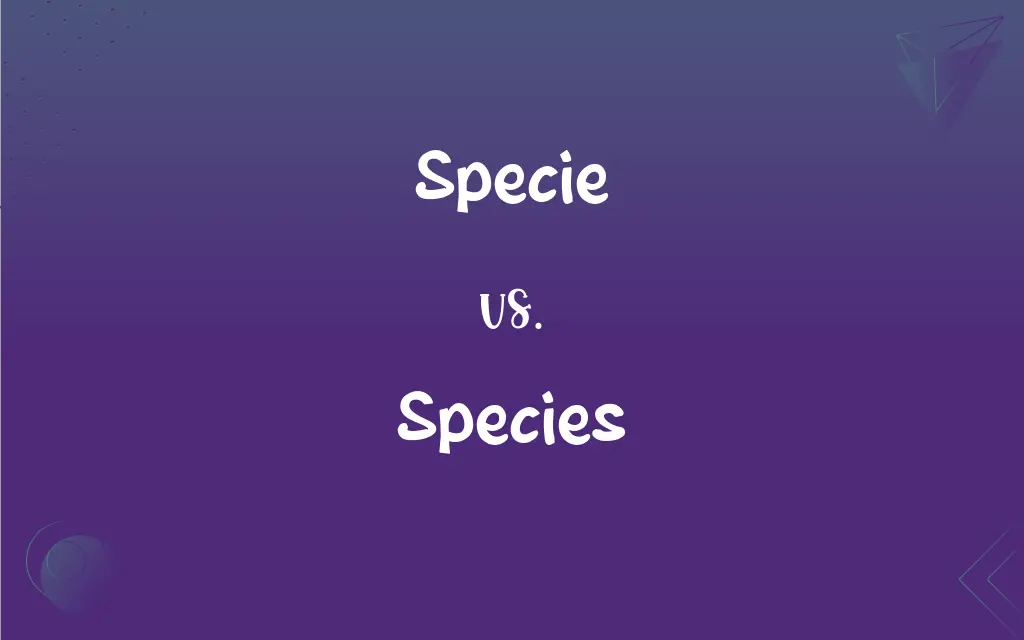Specie vs. Species: What's the Difference?
Edited by Harlon Moss || By Janet White || Updated on September 27, 2023
"Specie" refers to coin money or a payment in coins, while "Species" denotes a group of living organisms sharing common characteristics and are classified under a common name.

Key Differences
"Specie" and "Species" are terms that, despite their similar spellings, have very different meanings. "Specie" is a term used primarily in economics and finance, specifically referencing coin money or a mode of payment in coins. This term is often used in contexts related to financial transactions, economic models, and historical references to trade and commerce. It signifies tangible, metallic currency, usually made of gold or silver, that has intrinsic value. "Specie," in this context, stands in contrast to paper money or digital currency.
On the other hand, "Species" is a term used in biology to categorize a group of living organisms that share common characteristics and are classified under a common name. A "Species" is the basic unit of classification and taxonomic rank, and it can be defined as the largest group of organisms in which any two individuals can produce fertile offspring. This term is pivotal in ecological studies, conservation efforts, and scientific categorization of biodiversity, providing a foundation for understanding biological diversity and evolutionary biology.
Another notable difference is the usage and application of the terms. "Specie" has a more limited and specialized usage, often confined to discussions related to economics, finance, and trade. Its relevance is substantial in economic history, monetary theories, and financial analysis, offering insights into monetary values, trade practices, and economic strategies.
Conversely, "Species" has a broader and more versatile application, serving as a crucial concept in various scientific disciplines, including biology, ecology, evolution, and conservation science. "Species" supports the exploration of ecological interactions, evolutionary developments, genetic variations, and conservation priorities, facilitating a comprehensive understanding of life on Earth.
Lastly, the plural form of "Species" is also "Species," but it can refer to multiple groups of organisms. "Specie," however, does not have a different plural form as it is a mass noun, referring to coin money in general without a specific count.
ADVERTISEMENT
Comparison Chart
Field of Use
Economics and Finance
Biology
Meaning
Coin money or payment in coins.
Group of living organisms sharing common characteristics.
Usage
More limited and specialized.
Broader and versatile across scientific disciplines.
Plurality
Mass noun, no different plural form.
Same as singular, can refer to multiple groups.
Context
Economic history, monetary theories.
Ecological studies, evolutionary biology.
ADVERTISEMENT
Specie and Species Definitions
Specie
Metallic currency.
The ship carried specie to facilitate trade in the new land.
Species
A group of living organisms consisting of similar individuals.
The species of giant pandas is endangered.
Specie
Tangible currency.
The central bank held a large reserve of specie.
Species
Basic unit of classification in taxonomy.
Scientists discovered a new species of frog in the rainforest.
Specie
Coin money.
The government decided to stop the specie payment due to the financial crisis.
Species
A category in biological taxonomy.
The study focused on the migratory patterns of different bird species.
Specie
Payment in coins.
The trader preferred dealing in specie rather than paper money.
Species
A group capable of interbreeding to produce fertile offspring.
The two plants belong to the same species but different varieties.
Specie
Coins with intrinsic value.
The specie in the treasury were made of gold and silver.
Species
A class of individuals with similar characteristics.
The species of oak trees are known for their strength.
Specie
Coined money; coin.
Species
(Biology) A group of closely related organisms that are very similar to each other and are usually capable of interbreeding and producing fertile offspring. The species is the fundamental category of taxonomic classification, ranking below a genus or subgenus. Species names are represented in binomial nomenclature by an uncapitalized Latin adjective or noun following a capitalized genus name, as in Ananas comosus, the pineapple, and Equus caballus, the horse.
Specie
Type or kind, in various uses of the phrase in specie.
Species
(Logic) A class of individuals or objects grouped by virtue of their common attributes and assigned a common name; a division subordinate to a genus.
Specie
Money, especially in the form of coins made from precious metal, that has an intrinsic value; coinage.
Species
(Chemistry) A set of atoms, molecules, ions, or other chemical entities that possess the same distinct characteristics with respect to a chemical process or measurement.
Specie
(proscribed) species
Species
A kind, variety, or type
"No species of performing artist is as self-critical as a dancer" (Susan Sontag).
Specie
Coin; hard money.
Species
The outward appearance or form of the Eucharistic elements that is retained after their consecration.
Specie
Coins collectively
Species
Either of the consecrated elements of the Eucharist.
Species
Type or kind. race.}}
The male species
A new species of war
Species
A group of plants or animals having similar appearance.
This species of animal is unique to the area.
Species
A category in the classification of organisms, ranking below genus; a taxon at that rank.
Species
A particular type of atom, molecule, ion or other particle.
Species
(mineralogy) A mineral with a unique chemical formula whose crystals belong to a unique crystallographic system.
Species
An image, an appearance, a spectacle.
Species
(obsolete) The image of something cast on a surface, or reflected from a surface, or refracted through a lens or telescope; a reflection.
I cast the species of the Sun onto a sheet of paper through a telescope.
Species
Visible or perceptible presentation; appearance; something perceived.
Species
(Christianity) Either of the two elements of the Eucharist after they have been consecrated.
Species
Coin, or coined silver, gold, or other metal, used as a circulating medium; specie.
Species
A component part of compound medicine; a simple.
Species
Plural of specie
Species
Visible or sensible presentation; appearance; a sensible percept received by the imagination; an image.
Wit, . . . the faculty of imagination in the writer, which searches over all the memory for the species or ideas of those things which it designs to represent.
Species
A group of individuals agreeing in common attributes, and designated by a common name; a conception subordinated to another conception, called a genus, or generic conception, from which it differs in containing or comprehending more attributes, and extending to fewer individuals. Thus, man is a species, under animal as a genus; and man, in its turn, may be regarded as a genus with respect to European, American, or the like, as species.
Species
In science, a more or less permanent group of existing things or beings, associated according to attributes, or properties determined by scientific observation.
Species
A sort; a kind; a variety; as, a species of low cunning; a species of generosity; a species of cloth.
Species
Coin, or coined silver, gold, or other metal, used as a circulating medium; specie.
There was, in the splendor of the Roman empire, a less quantity of current species in Europe than there is now.
Species
A public spectacle or exhibition.
Species
A component part of a compound medicine; a simple.
Species
The form or shape given to materials; fashion or shape; form; figure.
Species
(biology) taxonomic group whose members can interbreed
Species
A specific kind of something;
A species of molecule
A species of villainy
FAQs
Can "Specie" refer to paper money?
No, specie specifically refers to coin money, not paper money.
Can "Species" refer to both plants and animals?
Yes, species is a classification that can be applied to both plants and animals.
Is "Species" always related to living organisms?
Yes, species is a biological term used to classify groups of living organisms.
Can "Specie" have a plural form?
No, specie is a mass noun and does not have a different plural form.
Is "Specie" still in use today?
Yes, but it is primarily used in a historical or economic context.
Can there be subspecies within a species?
Yes, subspecies are subcategories within a species, often due to geographical isolation.
Can "Species" refer to a single individual organism?
Typically, no. Species refers to a group of individual organisms sharing common characteristics.
Does "Specie" always have intrinsic value?
Typically, yes. Specie usually refers to coins made of metals that have intrinsic value.
Does the definition of "Species" vary across scientific disciplines?
The basic concept is consistent, but the criteria for classification might vary.
Can "Specie" be used to refer to any metallic coin?
Generally, yes. Specie refers to coin money, typically made of metals like gold or silver.
Is "Specie" valued more than paper money?
It depends on the context, but specie, being metallic currency, often has intrinsic value.
Is the use of "Specie" common in everyday language?
No, specie is a specialized term, most often used in economic or historical contexts.
Can "Specie" be made of materials other than metals?
Traditionally, no. Specie specifically refers to metallic coin money.
Is the term "Species" used outside biology?
It is primarily a biological term, but it can be used metaphorically in other contexts.
Is the classification of "Species" always clear-cut?
No, classifying species can be complex due to hybridization and continuous evolution.
About Author
Written by
Janet WhiteJanet White has been an esteemed writer and blogger for Difference Wiki. Holding a Master's degree in Science and Medical Journalism from the prestigious Boston University, she has consistently demonstrated her expertise and passion for her field. When she's not immersed in her work, Janet relishes her time exercising, delving into a good book, and cherishing moments with friends and family.
Edited by
Harlon MossHarlon is a seasoned quality moderator and accomplished content writer for Difference Wiki. An alumnus of the prestigious University of California, he earned his degree in Computer Science. Leveraging his academic background, Harlon brings a meticulous and informed perspective to his work, ensuring content accuracy and excellence.
































































